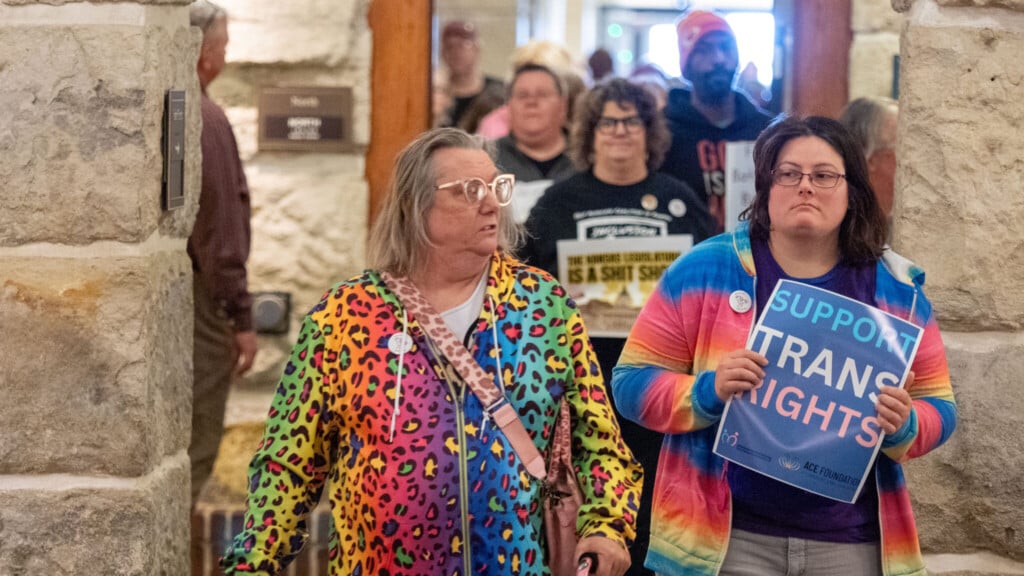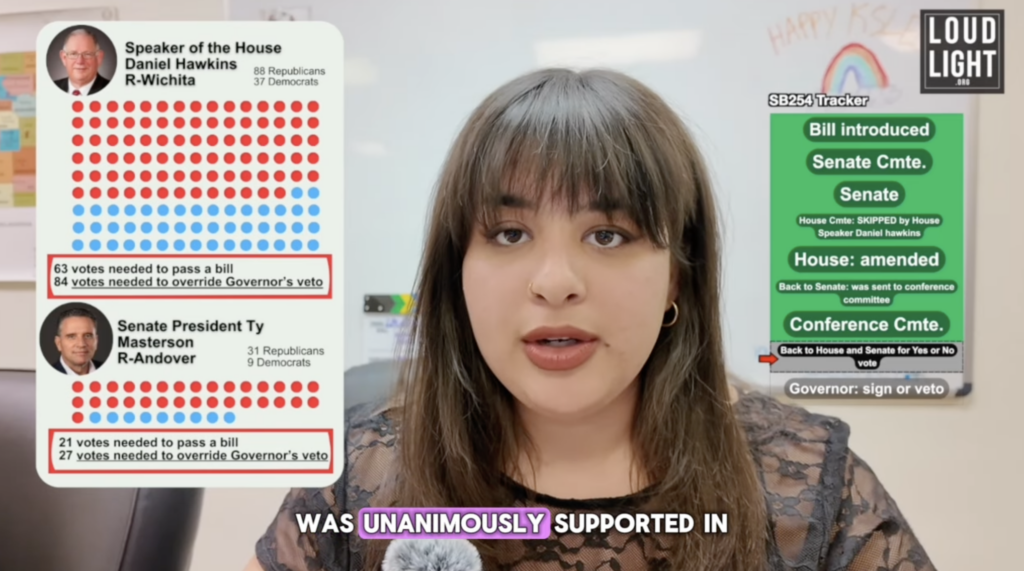Opinion: Inspecting Kansas and Missouri power players at the heart of the far-right’s porn censorship bid
It’s no secret that I have many bones to pick with our state’s elected officials. I told the lot of them in a previous column for The Pitch to go fuck themselves for instilling a “MAGA virus” and far-right Christian nationalism throughout Missouri. This time around, there is just more evidence to share that several leaders in Missouri and, of course, Kansas are simply servants of the far right. A recent series of amicus curiae briefs demonstrate this before the U.S. Supreme Court.
Kansas Attorney General Kris Kobach and Missouri Attorney General Andrew Bailey are parties to one of the filings. Sen. Josh Hawley is partied to a filing from Republicans in Congress. Other amicus filings were presented to the high court by a national coalition of state lawmakers, which included key lawmakers in the Kansas state legislature. So-called “parental rights” organizations are also signed to amicus briefs, such as the far-right, transphobic Kansas Family Voice group.
Why are these elected officials and organizations stumping at the land’s highest court? Let me give a little bit of background. On Jan. 15, 2025, the Supreme Court will hear oral arguments in a case that could potentially redefine what it means to have a right to free expression on the internet. The case is Free Speech Coalition et al. v. Paxton. A group of companies that operate in the pornography space sued Texas Attorney General Ken Paxton, a far-right Republican, last year in a bid to block an age verification law adopted by the Texas state legislature at the time.
Plaintiffs in the federal lawsuit, including the parent companies of some of the world’s most popular adult platforms, pointed out that the law, Texas House Bill (HB) 1181, could be used to violate the First Amendment rights of adult users and professionals in the adult entertainment and commercial sex spaces. Despite an initial ruling by a Ronald Reagan-era conservative federal judge in Austin, Tex., that called HB 1181 facially unconstitutional, the U.S. Fifth Circuit Court of Appeals threw out the lower court’s decision by applying a much lower standard of review than what is typically required in the space of freedom of speech cases. Now, SCOTUS will hear arguments as to whether HB 1181, which explicitly targets adult entertainment sites, is a “modest” regulation to protect minors from viewing age-restricted content or if it violates the First Amendment rights of millions of people—like in Kansas, where some sites are blocked.
The adult entertainment companies, the plaintiffs in the case, have a strong case related to the Fifth Circuit’s errors and the First Amendment claims of protected speech. Much of the material that HB 1181 and similar laws like it (e.g., Kansas SB 394) regulate is regarded as protected by the First Amendment, including sexual acts between consenting adults for audiovisual media.
Do note that this doesn’t matter to these assholes. The Fifth Circuit Court of Appeals is the most conservative and controversial appeals court in the United States. Critics have characterized it as “radical” and “dismantling democracy.” In a similar critique, I have called the Fifth Circuit “the appeals court equivalent to the short bus.” In the immediate case, they take the short-bus cake, so to speak, as it relates to how they only applied a rational review basis test as to whether HB 1181 is constitutional or unconstitutional.
A rational review basis test is a much lower standard of review than strict scrutiny, which is the standard the Fifth Circuit failed to apply when reviewing HB 1181 during the appeals process. The Supreme Court is being asked by the plaintiffs, amicus curiae parties supporting the adult entertainment companies, and the U.S. Department of Justice to apply strict scrutiny or send it back to the lower court.
However, the likelihood of Texas being able to defend the law successfully under strict scrutiny is slim. Strict scrutiny tests in a court of law must weigh whether a law grants a government a compelling interest to limit the speech rights of certain individuals so long it is narrowly tailored and the least restrictive means possible. As most are currently written, these age verification laws, like those in Texas and Kansas, serve as measures that restrict an individual or group of individuals from exercising speech due to the need to require an identification card or some other form of age estimation.
Age verification laws also violate the privacy rights of users due to the necessary reliance on a small group of software companies that would profit substantially from such laws. On top of all of this, age verification laws take the multifaceted and culturally diverse roles of parenting children away from the actual parent or guardian and put it in the hands of a class of technocrats and leaders backed by the far-right. Strict scrutiny tests ensure that the courts uphold individuals’ most fundamental constitutional and human rights, but the Fifth Circuit shied away from even doing its most basic function.
They applied rational review to present the Texas age verification law as a “public health” measure despite the apparent fact that age-gating regulations are another type of content restriction, like age-appropriate design codes on social networks or speech codes on public college and university campuses. These codes, in part or entirely, have been found to violate the First Amendment and have been gutted.
Those who filed amicus curiae briefs supporting Attorney General Paxton and the state of Texas seem to forget this basic understanding of First Amendment case law. As mentioned, Kansas AG Kris Kobach and Missouri AG Andrew Bailey signed on to an amicus led by the attorneys general of Indiana and Ohio. In total, 24 predominantly Republican state attorneys general chose to aid Paxton in defending the Fifth Circuit’s application of the lower standard of judicial review. In the brief from the members of Congress, which features Sen. Josh Hawley and many far-right Republicans, like Sen. Mike Lee of Utah and Rep. Lauren Boebert of Colorado, baselessly call pornography a “plague” and that porn companies aren’t entitled to the same First Amendment protections as people who go to church and praise the bearded guy in the sky every Sunday.
A brief filed by Kansas Family Voice (KFV) and scores of other “family policy” groups are central to anti-abortion, anti-LGBTQ+, and transphobia efforts right in Kansas, Missouri, and elsewhere.
KFV is a state affiliate of the Family Policy Alliance—the lobbying arm of fundamentalists over at Focus on the Family in Colorado Springs. These groups, collectively, are regarded as hate groups by civil rights watchdog groups, like GLAAD, and are characterized as a key network of Christian nationalists. Kansas state Sens. Mark Steffen, a controversial, far-right medical doctor from Hutchison, and Mike Thompson, a conservative from Shawnee, signed the amicus brief by the state lawmakers. That brief was also backed by the American Family Association and the group’s lobbying arm. Southern Poverty Law Center considers the association an anti-LGBTQ+ hate group linked to Christian nationalist efforts. Steffen and Thompson also voted for SB 394.
The rest of those who filed in support of Texas are a who’s who of organizations and individuals linked to the Heritage Foundation’s Project 2025 initiative that called for the prohibition of porn and the imprisonment of who they would consider to be pornographers. Project 2025 is linked to President-elect Donald Trump, despite his unconvincing disavowal of the network during the 2024 election. Note that Trump has appointed key architects of Project 2025 to powerful roles in his second administration. Others who filed amicus briefs include right-wing legal scholars and political operators who previously served at the Justice Department or White House during Trump’s first tenure. Many of the groups and individuals are regarded as Christian nationalists.
The organizations and individuals who have filed in support of the porn companies are from civil liberties and rights organizations from across the political spectrum. Groups supporting the Free Speech Coalition through amicus briefs include the Cato Institute, the National Coalition Against Censorship, and the Foundation for Individual Rights and Expression. American Civil Liberties Union attorneys represent the coalition, plaintiffs, and the adult firms’ various private counsel.
It shows that this case has national implications. Pornhub.com has geo-blocked Kansas. Missouri is expected to be one of the next GOP-held states to adopt one-sided age verification laws in the upcoming legislative session. There are legitimate freedom of speech concerns. In this case, I hope the high court sees through the errors and overarching far-right agenda.






